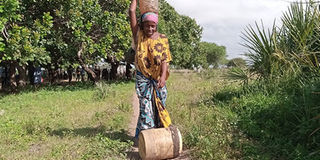Over 3,000 in Lamu’s Mokowe village hit by water shortage

A woman returns home after fetching water from a well in Lamu. More than 3,000 residents in Lamu’s Mokowe village and its environs are facing an acute shortage of water. PHOTO | KALUME KAZUNGU | NATION MEDIA GROUP
What you need to know:
- The residents are now forced to depend on water from well-wishers who supply it using boozers.
- The residents said shortage of fresh water has resulted in them suffering from strange skin ailments.
- The situation is the same in Bar’goni, Basuba, Milimani, Mararani and Mangai villages in Boni Forest.
More than 3,000 residents in Lamu’s Mokowe village and its environs are facing an acute shortage of water.
The situation has persisted for more than a week now.
The residents normally rely on water from boreholes but, recently, it has turned salty following drought in many parts of the county.
The residents are now forced to depend on water from well-wishers who supply it using boozers which are not available all the time.
BOREHOLE WATER SALTY
Speaking to journalists in Mokowe town on Tuesday, residents said more than 30 boreholes in the village and neighbouring areas have turned salty, forcing them to use the saline water for drinking and other domestic uses.
Mrs Khadija Yusuf said that on many occasions, they are forced to walk for more than 10 kilometres to Hindi town in search of water. Some even cross the Indian Ocean from Mokowe Jetty to Lamu Island using boats and dhows in order to get fresh water.
According to Mrs Yusuf, this always costs them dearly.
“We no longer have fresh water for drinking in Mokowe since drought set in. Almost all boreholes and wells which we used to depend on for water have now turned salty. If you can’t afford to ferry water from Lamu Island or Hindi town to Mokowe, then you have no option but to use saline water from boreholes. We need urgent help to solve this problem,” said Mrs Yusuf.
SKIN INFECTIONS
The residents also complained that the shortage of fresh water has resulted to their children and even adults suffering from strange skin ailments while others have discoloured teeth due to consumption of dirty and salty water.
Mrs Kahunda Charo pleaded with the Lamu County government to consider supplying them with fresh water using tractors and boozers instead of leaving the duty to well-wishers, some of whom are not reliable.
“Most of us here are poor and we can’t afford to buy and ferry water all the way from Lamu town or Hindi town to Mokowe. Most of us are forced to use the salty water to cook, drink, bathe and for other domestic purposes and, as such, many of us, especially children, are suffering from strange skin ailments. We are asking the county government to supply us with fresh water and save us from this agony,” said Mrs Charo.
The situation is the same in Bar’goni, Basuba, Milimani, Mararani and Mangai villages in Boni Forest where water in boreholes and wells is also reported to have turned salty.
But residents of these areas are a bit lucky as they sometimes get water from the nearby military and police camps.





